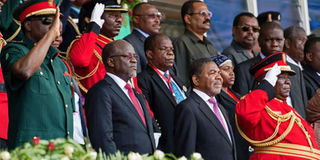US donor agency suspends $472m aid to Tanzania over Zanzibar elections

Tanzanian President John Magufuli (second left) and Zanzibar's newly elected President Ali Mohamed Shein (second right) during Mr Shein's swearing-in ceremony in Stone Town, Zanzibar, on March 24, 2016. AFP PHOTO | DANIEL HAYDUK
What you need to know:
- The move by the board of directors of Millennium Challenge Corporation (MCC) means that Tanzania will not be receiving an envisioned $472 million in funding for electricity projects.
- The US suspension-of-aid notification cites “arrests made during the elections” in Zanzibar as an indication of the Tanzania government having “engaged in a pattern of actions inconsistent with MCC's eligibility criteria.”
A US international development agency has suspended its partnership with Tanzania, citing flawed Zanzibar elections and the draconian Cybercrime Act.
The move by the board of directors of Millennium Challenge Corporation (MCC) means that Tanzania will not be receiving an envisioned $472 million in funding for electricity projects.
In addition to complaining that Tanzania had gone forward with a flawed Zanzibar electoral process “despite the repeated concerns of the US government,” the MCC board said Tanzanian authorities had failed to ensure that the country's Cybercrimes Act “would not be used to limit freedom of expression and association.”
The US suspension-of-aid notification cites “arrests made during the elections” in Zanzibar as an indication of the Tanzania government having “engaged in a pattern of actions inconsistent with MCC's eligibility criteria.”
“MCC’s model has a partner country’s commitment to democracy and free and fair elections at its core,” the directors' statement said.
Tanzania had previously been a favoured recipient of US development aid.
The country qualified in 2008 for nearly $700 million in US assistance for road, water and energy projects.
That ranked at the time as the largest single funding stream approved by MCC, an agency that makes development aid contingent on countries' compliance with a set of conditions involving human rights, governance and free-market economic policies.




